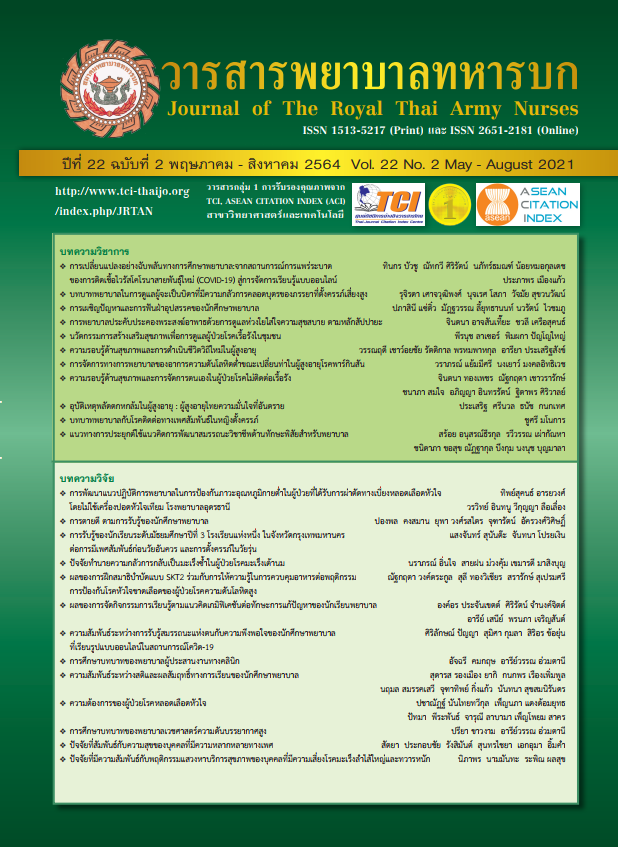Factors Predicting Fear of Cancer Recurrence among Patients with Breast Cancer
Keywords:
fear of cancer recurrence, pain, stress, optimism, social supportAbstract
The fear of cancer recurrence is a psychological problem that makes patients with breast cancer have improper coping behaviors. This predictive correlational study aimed to evaluate the fear of cancer recurrence and its predictors in breast cancer patients receiving radiotherapy and/ or chemotherapy at the outpatient departments of Chonburi Cancer Hospital. Ninety-four patients with breast cancer were recruited by a simple random sampling method. The research instruments included the personal data record form, the Fear of Cancer Recurrence Inventory Short Form (FCRI-SF), the Brief Pain Inventory Short Form (BPI-T), the Thai version of 10-Item Perceived Stress Scale (T-PSS-10), the Life Orientation Test Revised (LOT-R) and, the Social Support Questionnaire (SSQ). The Cronbach alpha coefficients were .87, .92, .85, .84 and .98 respectively. Data were analyzed by descriptive statistics and multiple regression analysis.
The results showed that 84 percent of the sample had a high level of fear of cancer recurrence (Mean = 22.80, SD = 5.76). Stress was only the factor that could predict fear of cancer recurrence among patients with breast cancer (β = .61, p <.05). Therefore, nurses should regularly assess the stress, causes of stress, and the fear of cancer recurrence in patients with breast cancer in order to promote patients’ ability to cope and manage stress properly to prevent fear of cancer recurrence during treatment.
Downloads
References
Yang Y, Cameron J, Bedi C, Humphris G. Fear of cancer recurrence trajectory during radiation treatment and follow-up into survivorship of patients with breast cancer. BMC Cancer. 2018;18(1):1-9.
Butow P, Sharpe L, Thewes B, Turner J, Gilchrist J, Beith J. Fear of Cancer Recurrence: A Practical Guide for Clinicians. Oncology (Williston Park). 2018;32(1):32-8.
Peng L, Huang W, Zhang W, Xu Y, Lu F, Zhong L. Psychometric Properties of the Short Form of the Fear of Cancer Recurrence Inventory (FCRI) in Chinese Breast Cancer Survivors. Frontiers in Psychiatry. 2019;10(1):1-7.
Simonelli LE, Siegel SD, Duffy NM. Fear of cancer recurrence: A theoretical review and its relevance for clinical presentation and management. Psycho-Oncology. 2017; 26(1): 1444-54.
Simard S, Thewes B, Humphris G, Dixon M, Hayden C, Mireskandari S. Fear of cancer recurrence in adult cancer survivors: A systematic review of quantitative studies. Journal of Cancer Survivors. 2013;7(1):300-22.
Leventhal H, Brissette I, Leventhal EA. The common-sense model of self-regulation of health and illness. New York: Routledge; 2003.
Janz K, Hawley T, Mujahid S, Griggs J, Alderman A, Hamilton A, Katz S. Correlates of worry about recurrence in a multi-ethnic populationbased sample of women with breast cancer. Nation Institute of Health. 2011;117(9):1827-36.
Wijayanti T, Afiyant Y, Rahmah H, Milanti M. Fear of cancer recurrence and social support among Indonesian gynecological cancer survivors. Archive of Oncology. 2018;11(3):227-41.
Lazarus RS, Folkman S. Stress, appraisal, and coping. New York: Springer; 1984.
Carver CS, Scheirer MF. Dispositional optimism. Trends in cognitive Sciences. 2014; 1(1):293-99.
Schaefer C, Coyne JC, Lazarus RS. The health related function of social support. Journal of Behavioral Medicine. 1981;4(4):381-406.
Janthathai A, Pongthavornkamol K, Wattanakitkrilert D, Soparattanapaisarn N. Factors Predicting Health–Related Quality of Life among Colorectal Cancer Survivors during 6 Months to 5 Years after Treatment Completion. 2018;36(4):52-65. (in Thai)
Chaudakshetrin P. Validation of the Thai Version of Brief Pain Inventory. Journal Medicine Association Thai. 2009;92(1):34-40. (in Thai)
Wongpakaran N, Wongpakaran T. The Thai version of the PSS-10: An investigation of its psychometric properties. BioPsychoSocial Medicine. 2010;4(1):1-6.
Yodrakang J. The Study of the Effect of Job Resources and Personal Resources Model on Personal Initiative through the Mediating Role of Work Engagement [dissertation]. Thammasat University; 2011. (in Thai)
Lueboonthavatchai P. Prevalence and psychosocial factors of anxiety and depression in breast cancer patients. The Journal of Medical Association of Thailand. 2007;90(10):2164-74. (in Thai)
Pamulila S, Paprom W, Wamaloon C. Life Scenes of Patients with Cholangiocarcinoma: A Case Study of One Province in The Northeast of Thailand. Journal of The Royal Thai Army Nurses. 2020;(21)3:86-97. (in Thai)
Utthiya P. Role of Home Care Nurses for Older Adults with End Stage Cancer. Journal of The Royal Thai Army Nurses. 2020;(21)1:18-25. (in Thai)
Downloads
Published
How to Cite
Issue
Section
License
บทความหรือข้อคิดเห็นใดใดที่ปรากฏในวารสารพยาบาลทหารบกเป็นวรรณกรรมของผู้เขียน ซึ่งบรรณาธิการหรือสมาคมพยาบาลทหารบก ไม่จำเป็นต้องเห็นด้วย
บทความที่ได้รับการตีพิมพ์เป็นลิขสิทธิ์ของวารสารพยาบาลทหารบก
The ideas and opinions expressed in the Journal of The Royal Thai Army Nurses are those of the authors and not necessarily those
of the editor or Royal Thai Army Nurses Association.






